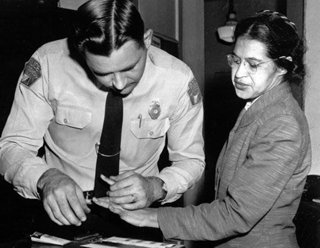Black History Month Feature:
Rosa Parks—The Spark that Started a Monumental Movement
 Rosa Parks is fingerprinted by police Lt. D.H. Lackey in Montgomery, Ala., Feb. 22, 1956, two months after refusing to give up her seat on a bus for a white passenger on Dec. 1, 1955. (source: abcnews.go.com)
Rosa Parks is fingerprinted by police Lt. D.H. Lackey in Montgomery, Ala., Feb. 22, 1956, two months after refusing to give up her seat on a bus for a white passenger on Dec. 1, 1955. (source: abcnews.go.com)
Black History Month is an annual observance for the remembrance of significant people and events in African-American history. It is celebrated in February in the United States and Canada. Youth for Human Rights International celebrates Black History Month in honor of all of those whose courage and determination helped secure the civil rights millions enjoy today.
With many people unaware of their rights, the question arises: who will make sure human rights are respected? To answer, we can draw inspiration from those who made a difference and helped create the human rights we have today. These humanitarians stood up for human rights because they recognized that peace and progress can never be achieved without them. Each, in a significant way, changed the world.
Rosa Louise McCauley Parks was born on February 4, 1913. An African American civil rights activist, she was appropriately named by the United States Senate “the mother of the freedom movement” and “the first lady of civil rights.” The events that filled her life have made her a lasting icon of human rights.
“I have learned over the years that when one’s mind is made up, this diminishes fear; knowing what must be done does away with fear.” – Rosa Parks
Parks’ legacy began in Montgomery, Alabama, on December 1, 1955, when she refused to obey the demands of a city bus driver, James F. Blake, that she give up her seat in the colored section of the bus to a white passenger due to a scarcity of seats.
“When that white driver stepped back toward us, when he waved his hand and ordered us up and out of our seats, I felt a determination cover my body like a quilt on a winter night.”
“He asked me why I didn't stand up... I told him I didn't think I should have to stand up. So I asked him: 'Why do you push us around?' And he told me, 'I don't know, but the law is the law and you are under arrest.'” – Rosa Parks.
Parks was charged with violating the Montgomery City code, however she had not actually disobeyed any law. She had been seated in the assigned black section of the bus when asked to give up her seat.
On December 4, 1955, a front page story in the Montgomery Advertiser and announcements at local black churches encouraging people to band together for desegregation catapulted the Montgomery Bus Boycott into what would be one of the most successful movements for desegregation, marking Parks as a symbol of the American Civil Rights movements and changing the lives of many world over. "I only knew that, as I was being arrested, that it was the very last time that I would ever ride in humiliation of this kind," Parks said.
She worked in collaboration with many other prominent figures of her time, including Martin Luther King, Jr., and Edgar Nixon, president of the local chapter of the National Association for the Advancement of Colored People.
In 1965, after the boycott had ended, Parks was hired as the secretary of John Conyers, an African-American U.S. Representative. She was employed by Conyers for 23 years until her retirement. Like many before him, Conyers was touched by Parks, and described her as someone you treated “with deference because she was quiet, so serene – just a very special person.”
Parks was selected as one of the people to meet Nelson Mandela upon his release from prison in 1994. She was honored with the Presidential Medal of Freedom from President Bill Clinton in 1996 and the Congressional Gold Medal in 1997 – the highest Congressional award. She passed away on October 24, 2005, at the age of 92.
Rosa Parks made a vast and intangible impact on the course of black history and human rights. She touched many nations, races, and creeds, and undoubtedly her legacy will affect many generations to come.
“Memories of our lives, of our works and our deeds will continue in others.” – Rosa Parks.
Youth for Human Rights International is a nonprofit organization founded in 2001 to teach youth about human rights and inspire them to become advocates for tolerance and peace. Since its inception, it has grown into a global movement, including hundreds of groups, clubs and chapters around the world.
